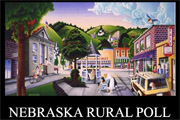Agricultural Economics, Department of

Nebraska Rural Poll
Date of this Version
2022
Document Type
Report
Citation
Nebraska Rural Poll, Research Report (January 2023) 22-4, 62 pages
Institute of Agriculture and Natural Resources, University of Nebraska-Lincoln
Also available at http://ruralpoll.unl.edu/pdf/22community.pdf
Abstract
Rural Nebraskans are less positive about the current change and expected future change in their communities this year. The proportion believing their community has changed for the better has typically been greater than the proportion believing it has changed for the worse. However, last year the proportion believing their community changed for the worse was slightly more than the proportion believing it had changed for the better (similar to what occurred in 2003 and 2009). This year, that gap widened a bit.
Despite that, rural Nebraskans are positive about their community by many different measures. Most rural Nebraskans rate their community favorably on its social dimensions, as friendly, trusting and supportive. Most rural Nebraskans also say it would be difficult to leave their community and have a positive attachment to their community. Finally, most rural Nebraskans disagree that their community is powerless to control its future.
Differences in perceptions of their community are evident by community size. Persons living in or near larger communities are more likely than persons living in or near smaller communities to get what they need in their community. However, persons living in or near the smallest communities are more likely than persons living in or near larger communities to have an attachment to their community.
Except for some services that are largely unavailable in rural communities, rural Nebraskans are generally satisfied with basic community services and amenities. However, the proportion of rural Nebraskans satisfied with many social services and entertainment services has decreased during the past 20 years. Declines in satisfaction levels across the past 20 years occur with nursing home care, medical care services, senior centers, mental health services and retail shopping.
Rural Nebraskans frequently interact with their family or friends as well as neighbors. Most rural Nebraskans talk to or spend time with family or friends at least a few times a week. Most rural Nebraskans also discuss political, societal, or local issues with their friends and family as well as have a conversation or spend time with neighbors at least a few times per month. Many rural Nebraskans say they and their neighbors do favors for each other and they spend time volunteering for organizations or associations in their community at least a few times a month.
When asked about community leadership, rural Nebraskans’ opinions have remained fairly stable over time, particularly when asked about the importance of leadership to their community. However, their opinions about other aspects of leadership have changed over time. Fewer rural Nebraskans agree with the power of ordinary citizens in helping their community leadership be more effective as well as feeling a personal responsibility to participate to make it more effective than they did in 2015. Similarly, fewer rural Nebraskans agree that they are preparing youth to be effective leaders in the community. Finally, fewer rural Nebraskans agree this year that their community leaders do a good job overall.
Most rural Nebraskans agree that strong and effective community leadership can prevent their community’s decline and can solve the problems their community faces today. However, opinions are mixed on whether or not the youth are being prepared to be both effective leaders and volunteers in their community. Many rural Nebraskans see technology as a tool that can be used by community leaders to engage more residents, particularly younger persons.
Most rural Nebraskans believe getting more residents to get involved in leadership in their community is critical to its future. And, rural Nebraskans believe volunteering is important to their community. However, despite this belief in the importance of volunteering, many rural Nebraskans agree that they are volunteering less than before.
Included in
Agribusiness Commons, Agricultural and Resource Economics Commons, Civic and Community Engagement Commons, Community-Based Research Commons, Demography, Population, and Ecology Commons, Entrepreneurial and Small Business Operations Commons, Place and Environment Commons, Public Affairs, Public Policy and Public Administration Commons, Regional Economics Commons, Rural Sociology Commons

